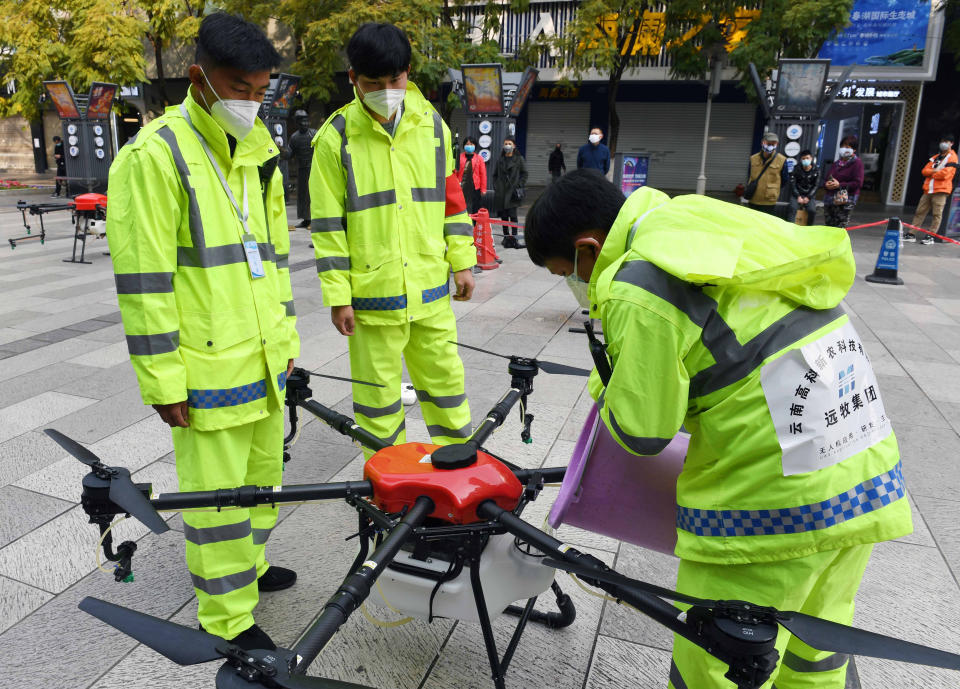‘Hellish life’: How drones are changing life in coronavirus-era China

When Australian couple Jan and Dave Binskin posted on Facebook about how a drone delivered wine to their cabin on the Diamond Princess, it caught rapid fire on the internet.
Related story: Scary coronavirus detail that has 'never been seen before'
Related story: Coronavirus set to claim 133,000 Aussie jobs
Related story: China’s major financial index warns of ‘huge’ Australian damage
The only problem was it was a prank: the couple hadn’t received the wine via drone, and only wanted to have a little Facebook fun while cooped up on board.
While that story was a furphy, elsewhere governments are deploying drones to deliver goods, provide cleaning services and conduct surveillance amid the coronavirus outbreak.
Shenzhen drone company MicroMultiCopter (MMC) in February said it deployed more than 100 drones and 200 people to Shanghai, Guangzhour, Foshan and Zhaoqing to “participate in the battles” and reduce the risk for frontline staff.
Drones have joined fight against novel #coronavirus (COVID-19) in China. Equipped with thermal imaging technology, they can detect those with a fever up in the air. Check out drone patrol in central China's Hunan pic.twitter.com/BP6ZTYTdkA
— China Xinhua News (@XHNews) February 16, 2020
Those drones were used to patrol the regions to identify groups of crowds and people not wearing masks before being “dispersed by the commanders” through megaphones on the drones, the company said in a statement.
MMC drones were also deployed to spray disinfectant in public spaces like stations and supermarkets.
And, the drones also used thermal cameras to sense each person’s temperature.
"At first, our drones are used only in aerial broadcasting, and it goes deeper in front-line use since the situation is getting more serious, further functions are required so we quickly formed an online research and development team and carried out the solutions," said Lu Zhihui, chairman of MMC.
Chinese officials in rural areas are creatively using #drones to make sure local residents don‘t gather together without wearing masks during the nationwide battle against the #coronavirus. https://t.co/e6khcWvUrx pic.twitter.com/td7u1ZZ4Kz
— Global Times (@globaltimesnews) January 31, 2020
Another video shared by the China Global Times shows drones directing people in rural China to go home if they’re not wearing a mask.
The video sparked references to George Orwell’s dystopian novel 1984.
“George Orwell could never have imagined this day,” one person said.
George Orwell could never have imagined this day.
— che (@BoilingPlanet) January 31, 2020
“Truly Orwellian,” added another.
Truly orwellian .
— Assowe (@mohassow) January 31, 2020
“What sort of a hellish life is this,” another said in shock.
Holy shit .. What sort of a hellish life is this
— Rakesh Kumar (@rakesh_ebull) February 1, 2020
Medical supplies and food

Separate drone company, Terra Drone, has used its robots to transport medical samples and material throughout China.
In a statement, the company said the drones have increased efficiency by more than 50 per cent compared to road transportation.
“At the same time, with more and more medical staff and ambulance being transferred to the front line, in the case of extreme personnel shortage, the use of drone transportation can also save human and material resources to the greatest extent,” the company added.
“In addition, using a drone to transport materials can effectively avoid secondary pollution of medical materials.”
Chinese internet firm JD.com has also announced the use of drones to deliver medical supplies, food and necessities.
“During the epidemic period, JD.com has already provided a total of 120 million individual food items, covering rice, flour, noodles, grain, cooking oil, meat, eggs, vegetables, milk and other daily necessities, weighing over 160,000 tons, to consumers across the country,” the company said in a statement.
Delivery app Meituan Dianping has also gotten on board, announcing it is launching a “contactless delivery” service across China, first using the autonomous vehicles to deliver groceries in Beijing.
“This project is to minimize the risk of potential infections caused by human contact and meet the needs of customers in this special time,” the company said.
A spokesperson said the drones can take up to 100kg of groceries at a time.
Have you interacted with a drone in China? Get in touch here.
Make your money work with Yahoo Finance’s daily newsletter. Sign up here and stay on top of the latest money, news and tech news.
Follow Yahoo Finance Australia on Facebook, Twitter, Instagram and LinkedIn.

 Yahoo Finance
Yahoo Finance 
